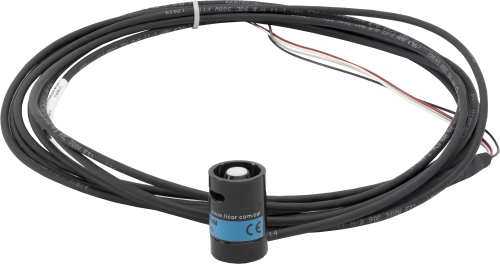This product has limited availability. It will be replaced by: CS310. Some accessories, replacement parts, or services may still be available when it is no longer available.

Compatible with most Campbell Scientific data loggers






Overview
The LI190R Quantum Sensor, manufactured by LI-COR, accurately measures photosynthetic photon flux density (PPFD), which is the number of photons in the 400 to 700 nm waveband incident per unit time on a unit surface. It uses a silicon photovoltaic detector mounted in a cosine-corrected head. A shunt resistor in the sensor’s cable converts the signal from microamps to millivolts, allowing these sensors to be measured directly by a Campbell Scientific data logger.
.
Benefits and Features
- Ideal for growth chambers and greenhouses
- Measures photosynthetic photon flux density (PPFD) in both natural and artificial light
- Compatible with the CWS900-series interfaces, allowing it to be used in a wireless sensor network
The "-L" on a product model indicates that the cable length is specified at the time of order.
Images










Detailed Description
The LI190R measures solar radiation with a silicon photovoltaic detector mounted in a cosine-corrected head. A shunt resistor in the sensor’s cable converts the signal from microamps to millivolts, allowing the LI190R to be measured directly by a Campbell Scientific data logger. The LI190R accurately measures Photosynthetic Photon Flux Density (PPFD), which is the number of photons in the 400 to 700 nm waveband incident per unit time on a unit surface. Because PPFD describes photosynthetic activity, the LI190R is ideal for growth chambers and greenhouses.
Compatibility
Please note: The following shows notable compatibility information. It is not a comprehensive list of all compatible products.
Data Loggers
| Compatible | Note | |
|---|---|---|
| CR1000 (retired) | ||
| CR1000X (retired) | ||
| CR300 (retired) | ||
| CR3000 (retired) | ||
| CR310 | ||
| CR350 | ||
| CR6 | ||
| CR800 (retired) | ||
| CR850 (retired) |
Additional Compatibility Information
Mounts
To ensure accurate measurements, the sensor should be leveled using an LI2003S leveling fixture, which incorporates a bubble level and three adjusting screws. The LI2003S leveling fixture mounts to a tripod using the 015ARM or to a crossarm using the CM225 mount. These sensors should be mounted away from all obstructions and reflective surfaces that might adversely affect the measurement.
Data Logger Considerations
The LI190R-L requires one differential analog input channel per probe.
Specifications
| Sensor | Silicon photovoltaic detector mounted in a cosine-corrected head |
| Measurement Description | Measures photosynthetic photon flux density (PPFD) in both natural and artificial light |
| Spectral Range | 400 to 700 nm |
| Calibration | ±5% traceable to the U.S. National Institute of Standards Technology (NIST) |
| Sensitivity | Typically 5 to 10 μA per 1000 μmoles s-1 m-2 |
| Linearity | Maximum deviation of 1% (up to 10,000 μmole s-1 m-2) |
| Shunt Resistor | 604 Ω, 0.1%, 25 ppm |
| Long-Term Stability | < ±2% change over a 1 year period |
| Response Time | < 1 μs |
| Temperature Dependence | 0.15% per °C (maximum) |
| Cosine Correction | Cosine corrected up to 82° angle of incidence |
| Operating Temperature Range | -40° to +65°C |
| Relative Humidity Range | 0 to 100% (non-condensing) |
| Detector Description | High-stability silicon photovoltaic (blue enhanced) |
| Sensor Housing Description | Weatherproof anodized aluminum case with acrylic diffuser and stainless-steel hardware; O-ring seal on the removable base and cable assembly |
| Diameter | 2.36 cm (0.93 in.) |
| Height | 3.63 cm (1.43 in.) |
| Weight | 84 g (2.96 oz) |